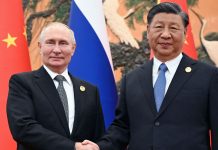DM Monitoring
HANGZHOU: On a sunny spring morning, Chen Ying and Huang Qianrui tied the knot, 36 days later than their original schedule.
A registrar delivered them the marriage certificates before they took an oath.
“I have waited so long for this moment before finally marrying my hero,” the groom Huang said with a masked smile.
Born in 1996, Chen is a nurse from the Fourth Affiliated Hospital Zhejiang University School of Medicine in the city of Yiwu, east China’s Zhejiang Province.
She and her fiance had expected to register their marriage on Valentine’s day before the outbreak of the novel coronavirus disrupted their plan.
As the epidemic sickened more than 80,000 people on the Chinese mainland, hundreds of thousands of medics had to isolate themselves from their beloved ones, risking their lives to treat the infected patients.
On Jan. 25, the Chinese Lunar New Year, Chen was having a family banquet when the hospital called her to return for urgent training to prepare for entering the isolation ward.
In her own words, the ward was a battlefield.
“I did not expect the fight would be so tough,” she said, adding that she worked for over 10 hours every day.
In encapsulating protective gear, she gave blood drawing, transfusion, injection to the patients. She was also in charge of disposing of medical waste — wrapping the waste in four layers and tying a gooseneck knot before proper delivery. Disinfection was also a must.
Chen moved to the hospital dormitory for fear of passing the virus to her family. But Huang stayed with her, by phone.
“We were used to clinging to each other, so I didn’t know what to do after she was gone,” said Huang, a floor mat seller.
Between her dorm and the ward was a footpath she was afraid of taking when her night shift ended. Normally, Huang would wait for her at the ward and walk her home. Now that he was not allowed to enter, he accompanied her with the walk via video call every day.
Through the feeble mobile light, Huang could see the bruises on Chen’s face, which was left by goggles and respirators worn for a long time.
“I could imagine how hard her work was,” he said.
Huang signed up to be a volunteer as soon as his residential community set up checkpoints for the closed-off management amid the epidemic.
“If I did a good job in the neighborhood, she might have fewer patients to take care of,” he said.
Eleven days later, the love birds finally saw each other at the infection building entrance, divided by glass. Huang brought Chen fish soup, ground beef, chicken legs, milk and snacks, all her favorites.
“I miss home. I wanna hug you,” Chen said over the phone, crying.
“Me, too. You have got darker circles under your eyes. You look much slimmer,” said Huang, who also shed tears.
They moved their faces near the glass door and kissed each other through the glass and face masks.
The scene was captured by a hospital worker and later covered by news reports, touching the Internet users.
In Mid-March, when the last COVID-19 patient was cured and discharged from hospital in the city of Yiwu, Chen was finally able to head home.
Bringing a cake, flowers and a ring, Huang came to the hospital to pick her up. He proposed for a second time in front of her colleagues.
“After all these days, will the current you marry the current me?” he asked, followed by a “yes” from Chen.






